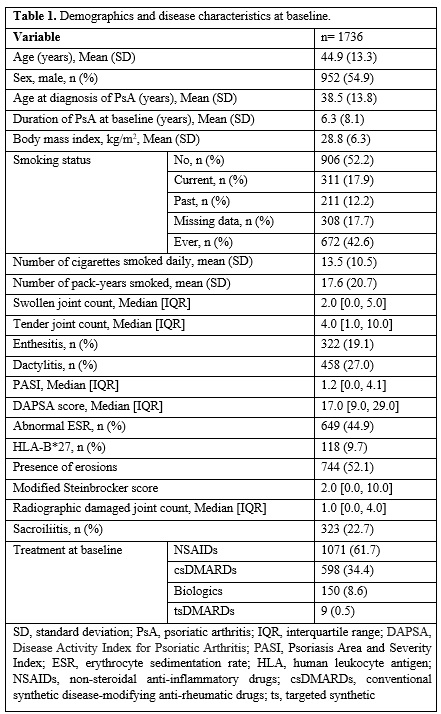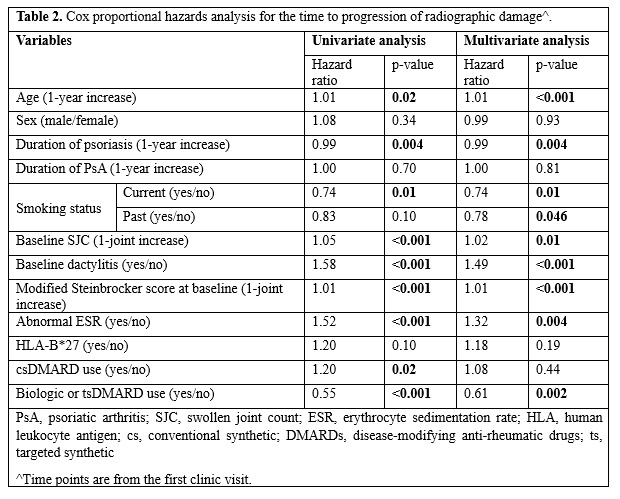Session Information
Date: Sunday, November 17, 2024
Title: SpA Including PsA – Diagnosis, Manifestations, & Outcomes Poster II
Session Type: Poster Session B
Session Time: 10:30AM-12:30PM
Background/Purpose: The association between smoking and radiographic damage has been established in axial spondyloarthritis and rheumatoid arthritis, but not in psoriatic arthritis (PsA). We designed this study to investigate this relationship in PsA.
Methods: We included patients with PsA followed at our prospective observational cohort. Smoking status was evaluated from the baseline visit up until the first detection of progression of radiographic damage, defined as an increase of ≥1 point on the modified Steinbrocker score (mSS). We classified patients as non-smokers, past smokers, and current smokers. We used Cox regression analysis to determine the factors associated with the time to progression of peripheral joint damage; to account for potential collider bias, which could be introduced by uncontrolled confounding, we evaluated the following covariates at baseline only (and not longitudinally): swollen joint count (SJC), dactylitis, mSS, and abnormal erythrocyte sedimentation rate (ESR).
Results: Of 1736 patients included in the study, 952 (54.9%) were males, with a mean (standard deviation) age of 44.9 (13.3) years and PsA duration of 6.3 (8.1) years at baseline (Table 1). 906 (52.2%) were non-smokers, 211 (12.2%) were past smokers, and 311 (17.9%) were current smokers; 308 (17.7%) had missing smoking data. At baseline, 744 (52.1%) patients had erosions, with a median [interquartile range] mSS of 2.0 [0.0, 10.0]. In the multivariate Cox regression model, older age (HR 1.01, p< 0.001), shorter duration of psoriasis (HR 0.99, p=0.004), higher baseline SJC (HR 1.02, p=0.01) and mSS (HR 1.01, p< 0.001), as well as baseline dactylitis (HR 1.49, p< 0.001) and abnormal ESR (HR 1.32, p=0.004) were all associated with a shorter time to progression of joint damage (Table 2). Smoking (current and past; HR 0.74, p=0.01 and HR 0.78, p=0.046, respectively) and use of advanced therapy (biologic or targeted synthetic drugs) (HR 0.61, p=0.002) were associated with a longer time to progression of joint damage.
Conclusion: Cigarette smoking does not appear to be positively associated with the progression of peripheral joint damage in PsA. Further studies are required to confirm our findings.
To cite this abstract in AMA style:
Kharouf F, Maldonado Ficco H, Gao S, Sheanne b, Pereira D, Cook R, Chandran V, Gladman D. The Association of Cigarette Smoking with Radiographic Progression in Psoriatic Arthritis [abstract]. Arthritis Rheumatol. 2024; 76 (suppl 9). https://acrabstracts.org/abstract/the-association-of-cigarette-smoking-with-radiographic-progression-in-psoriatic-arthritis/. Accessed .« Back to ACR Convergence 2024
ACR Meeting Abstracts - https://acrabstracts.org/abstract/the-association-of-cigarette-smoking-with-radiographic-progression-in-psoriatic-arthritis/


